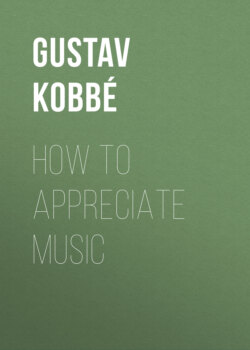Читать книгу How to Appreciate Music - Gustav Kobbé - Страница 22
На сайте Литреса книга снята с продажи.
What Counterpoint Lacks.
ОглавлениеThe lack of highly personal expression in contrapuntal compositions explains why most concert-goers find them less attractive than modern music. The “D Minor Toccata and Fugue” or the “Chromatic Fantasie and Fugue” by Bach, even in the arrangements of Tausig and Liszt, on the program of a pianoforte recital, are tolerated because of the modern pieces that come later. Nine out of ten persons in the house would rather omit them. Why deny so obvious a fact, especially when it is easy enough to explain? To follow a contrapuntal composition intelligently requires a highly trained ear. Moreover, in such a work as a Bach fugue the individuality of the player is of less importance than in modern music. Yet a virtuoso’s individuality is the very thing that distinguishes him from other virtuosos and attracts the public to his concerts, while those of other players may be poorly attended. I firmly believe in personality of the virtuoso or singer or orchestral conductor, for in it lies the secret of individual interpretation, the reason why the performance of one person is fascinating or thrilling and that of another not. Modern music affords the player full scope to interpret it according to his own mood and fancy, to color it with his own personality, whereas contrapuntal music exists largely for itself alone. It is music for music’s sake, not for the sake of interpreting some mood, some feeling, or of painting in tone colors something quite outside of music. The player of counterpoint is restricted in his power of expression 59 by the very formulas of the science or art of the contrapuntist. We may marvel that Bach was able to move so freely within its restricted forms. But I think it true that it is far more interesting for a person even of only moderate proficiency as a player to work out, however awkwardly, a Bach fugue for himself on the pianoforte than to hear it played by some one else, however great; for, cheap and easy as it is to protest in high-sounding phrases about the duty of the interpreter to subordinate himself to the composer, and against what I am about to say, I nevertheless make bold to affirm that it is the province of the virtuoso to express himself, his own personality, his moods, his temperament, his subjective or even his subconscious self, through music; and in music that is purely contrapuntal there is a barrier to this individual power of expression.
